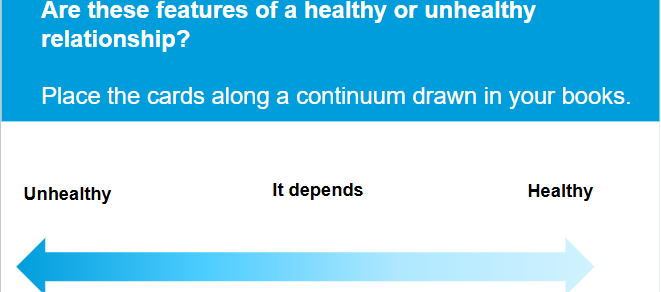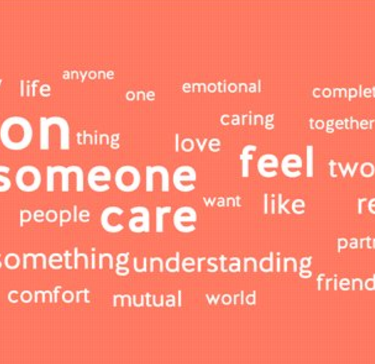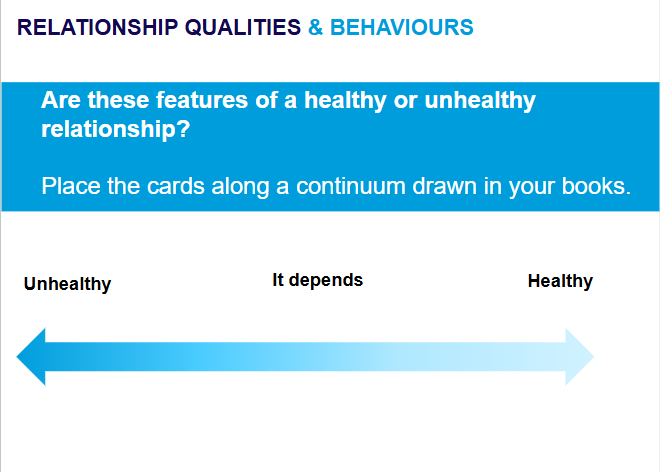KS4 PSHCE

22nd November 2024
Year 10 - Managing healthy and unhealthy relationships behaviours
Building and maintaining relationships is an essential part of growing up, especially in a diverse and dynamic international school community. Whether it is with friends, family, teachers, or peers, relationships shape our everyday experiences and help us learn about the world and ourselves. Year 10s have explored the characteristics of healthy and unhealthy relationships and studied strategies to manage and de-escalate conflicts. Through sort cards activities, scenarios and discussions they showed their understanding of consent, how to recognise unhealthy relationships, and also developed their ability to give advice.
A healthy relationship is built on mutual respect, trust, and open communication. Here are some key elements to look for:
- Respect: Both individuals value each other’s opinions, boundaries, and individuality.
- Communication: Honest and open dialogue is encouraged, with both sides actively listening.
- Trust: Confidence in each other without constant suspicion or doubts.
- Support: Encouraging one another to grow, succeed, and be their best selves.
- Equality: Power is shared equally, and decisions are made together.
For example, a friend who respects your feelings, supports your goals, and communicates honestly is someone contributing positively to your life.
Unhealthy relationships can sometimes be harder to spot because they may start subtly. Look out for these red flags:
- Lack of Respect: Ignoring your boundaries or dismissing your feelings.
- Poor Communication: Silent treatment, constant interruptions, or refusing to listen.
- Control: One person dominates decisions or manipulates the other.
- Jealousy and Possessiveness: Overreactions to time spent with others or excessive monitoring.
- Neglect or Abuse: Ignoring your needs, insulting you, or physical harm.
For example, if a friend makes fun of you in front of others or demands all your time, it may indicate an unhealthy dynamic.
Steps to nurture healthy relationships:
- Set Boundaries: Clearly communicate what you are comfortable with and respect the boundaries of others.
- Learn to Communicate: Practise active listening and express your thoughts calmly and clearly.
- Focus on Self-Respect: Recognise your worth and refuse to settle for disrespectful treatment.
- Seek Help When Needed: If you are unsure about a relationship, talk to a trusted adult or counsellor.
If you recognise an unhealthy relationship in your life:
- Reflect: Consider how this relationship impacts your well-being.
- Speak Up: Communicate your concerns honestly.
- Seek Support: Talk to a parent, teacher, or school counsellor for guidance.
- Step Away: If the situation does not improve, it is okay to distance yourself or end the relationship.
At an international school, we are surrounded by people from different cultures, backgrounds, and perspectives. Embrace this diversity! It is an opportunity to learn and grow while building meaningful connections with others. Celebrate differences, and always approach relationships with kindness and empathy.
A healthy relationship is a two-way street where everyone feels valued and supported.
If you are going through difficult times or you are worried about someone, talk to a trusted adult or friend, call Childline Kenya 116 or use their online chat https://childlinekenya.co.ke/
Mme Mwangi


PSCHE Sessions with Year 11 Students – Term Highlights
This term, our Year 11 students have been engaging in a series of thought-provoking and educational PSCHE sessions, centred around the theme of Family, Parenting, and Routes to Parenthood. These sessions aimed to provide students with an understanding of family dynamics, legal frameworks, and the responsibilities that come with parenting and starting a family. Here is an overview of what we explored:
Family and Parenting: Long-Term Commitment
We delved into the importance of long-term commitment within families, discussing:
- The value of stable relationships in raising children and maintaining strong family bonds.
- The issue of forced marriage, ensuring students understood the distinction between culturally arranged marriages and those that are legally and morally coercive.
- The legal marriage framework, explaining the rights and responsibilities tied to marriage and why individuals might choose different forms of commitment, such as civil partnerships, cohabitation, or traditional marriage.
Legal Frameworks for Family and Parenting
Students learned about the legal responsibilities of parents and guardians, focusing on:
- The different legal types of commitment available globally and how they provide security for children and partners.
- Why individuals may choose one form of commitment over another, considering factors like personal values, financial implications, and legal protections.
Parenting: Responsibilities and Challenges
We explored the roles and responsibilities of parents at different stages of a child’s life, from infancy to adolescence and beyond. Key discussions included:
- The emotional, financial, and social responsibilities parents face.
- The challenges of adapting to children’s changing needs as they grow, such as providing education, fostering independence, and ensuring their well-being.
Fertility, Pregnancy, and Adoption: Routes to Parenthood
Students explored various pathways to parenthood, including:
- Fertility and its challenges, understanding conditions like infertility and options such as IVF and surrogacy.
- Adoption as a meaningful way to create a family, focusing on the legal process and the lifelong commitment it entails.
Fertility, Pregnancy, and Adoption: Support During Pregnancy
In sensitive yet crucial discussions, students learned about:
- The choices available during pregnancy, including abortion and the law in Kenya and other countries in the world, adoption, and parenting, while emphasising the importance of informed and compassionate decision-making.
- The resources and support available to expectant parents, such as counselling services, healthcare support, and community organisations.
Key Takeaways
These PSCHE sessions empowered Year 11 students with a deeper understanding of family life, parenting, and the complex decisions surrounding fertility and pregnancy. By discussing these topics in a safe and inclusive environment, we hope to equip our students with the knowledge and empathy needed to navigate these important aspects of adulthood.
We encourage parents and guardians to engage in discussions with their children about what they have learned this term.
Mr Nyabuto Samuel



